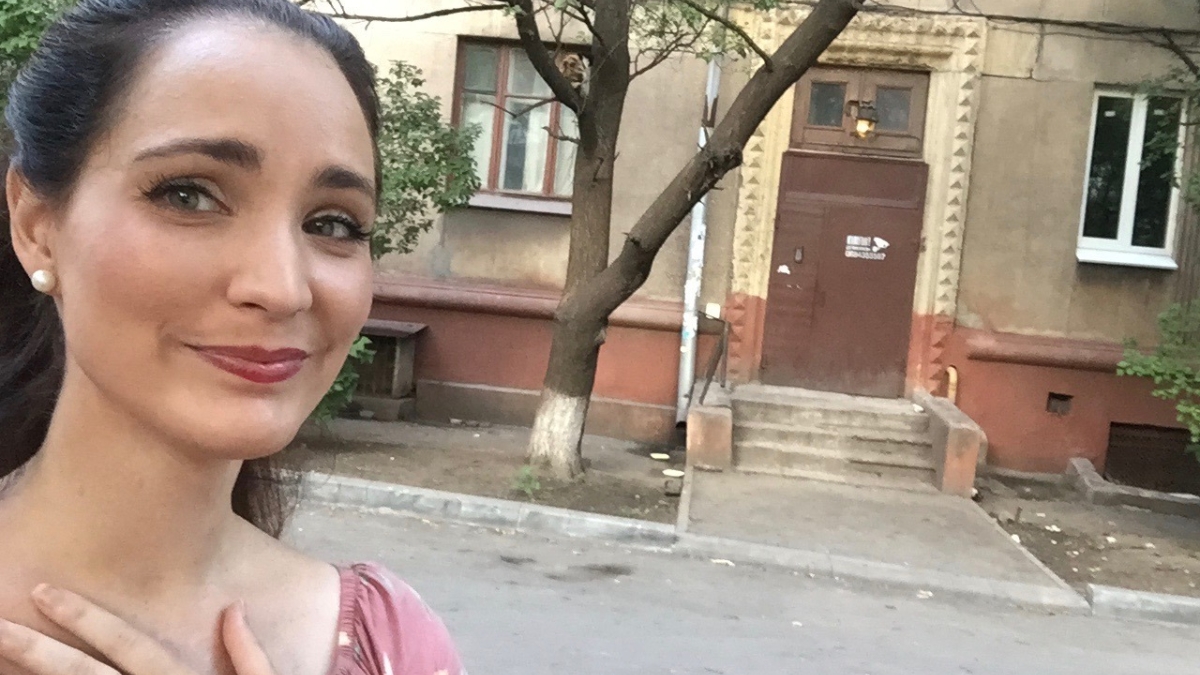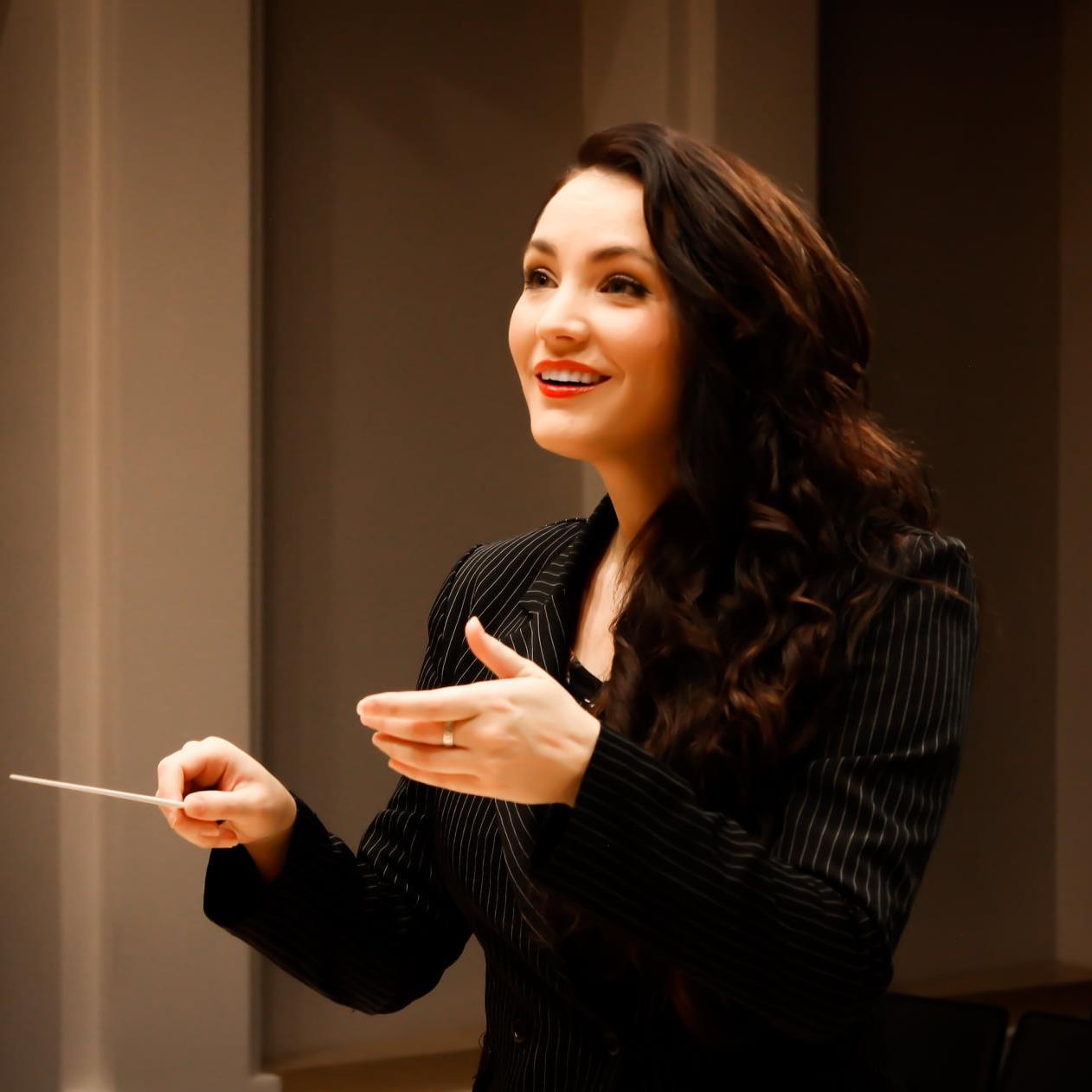An Arizona State University alumna whose dissertation focused on Ukraine’s first female composer and who studied Ukrainian in Kyiv through the ASU Melikian Center has become deeply involved in humanitarian and anti-war efforts in Ukraine.
Erica Glenn, a visiting professor at BYU-Hawaii, will travel to Poland next month on a Fulbright grant to conduct research and assist refugees who have been displaced.
Glenn earned a doctorate in choral conducting from the ASU School of Music, Dance and Theatre in 2020. She lived in Mariupol, Kharkiv and Donetsk, Ukraine, starting in 2008, becoming fluent in Russian. She later studied Ukrainian in Kyiv, forming a deep bond with the country and its people. Much of her musicological research centers on Ukraine, which was attacked by Russian troops starting in February.
“This is heartbreaking because they have worked so long and so hard to be independent,” she said.
“I speak Russian, Ukrainian and Polish, which happen to be the three most vital languages now in this crisis. Poland has become a major escape route for refugees.
“I’ve translated instructions on how to tie a medical tourniquet into Ukrainian and Russian. I’ve collaborated on relief efforts with people hiding in bomb shelters in Kyiv. It feels absolutely surreal.”
Glenn also earned a bachelor of music degree at ASU, as well as two master’s degrees elsewhere, one from the Longy School of Music and one from Harvard. She was director of performing arts and a member of senior management at the high school level for three years before returning to ASU to pursue her doctorate.
Glenn helped rediscover the missing scores of a female composer from Ukraine, Stefania Turkevych. For her dissertation project, Glenn conducted the U.S. premiere of one of Turkevych’s operas in Ukrainian in 2019 at ASU. For her Fulbright project, she will write the first English-language biography of Turkveych.
“Turkevych has several symphonies and operas and hundreds of chamber works,” said Glenn, who is now the director of choirs and a visiting professor of music at Brigham Young University-Hawaii.
Erica Glenn, who earned a doctorate at ASU, is the choral director and visiting professor at Brigham Young University-Hawaii.
“Her music is extraordinary, but she fled the Soviet Union because her works did not comply with Socialist Realism. Her whole story and most of her music has been lost in the annals of history.”
Glenn traveled to Ukraine in 2019 on a Melikian Center scholarship to study Ukrainian, and she saw significant changes from her time there in 2008.
“2008 was roughly 17 years after the fall of the Soviet Union but, especially in the east, it still felt very Soviet,” she said.
In 2019, she lived in Kyiv and revisited many of the cities in the east.
“They had beautiful new landscaped parks, buildings had been updated, and the economy was in better shape. They had even pulled down the statues of Lenin that used to dominate the main squares,” she said.
In 2020, Glenn won a Fulbright grant to return to Lviv, Ukraine, the birthplace of Turkevych, to conduct archival research. She also received funding from the Melikian Center for a lecture tour about Turkevych in Boston and New York, just days before the country shut down for the pandemic.
She managed to produce an audio recording of Turkevych’s opera, “The Heart of Oksana,” with other ASU students in Katzin Concert Hall just two days before the university went remote in March 2020.
Then she learned that her Fulbright had been placed on hold.
“I was looking for ways to fill that gap. And I saw that the Critical Languages Institute had moved all of their programs online,” she said.
“I thought, I’ve studied Russian and Ukrainian, so the next step would be to study Polish. So I did.”
As the pandemic dragged on, Glenn moved to Utah and founded a business that helps choirs move rehearsals and performances to a digital space. She also produced digital music education content for the Kennedy Center in Washington, D.C. She was hired to conduct the BYU-Hawaii Concert Choir virtually, which eventually led her to accept a full-time position at the university, which is in Laie, Hawaii.
Glenn was able to defer her Fulbright award to 2022, only to see it jeopardized again after the attack on Ukraine by Russian President Vladimir Putin.
“Because most of the other Fulbrighters were already on the ground in Ukraine, I was attending a lot of virtual meetings, and I was there when they told everyone, ‘You have to get out, and you have three days to do it.’ Some had entire families with them and had to pull their kids out of school and figure out the complicated logistics of relocating.
“Nobody thought Putin would go straight for Kyiv and launch such a brutal attack on civilians,” she said.
Since then, Glenn has been online daily, translating messages, connecting people to relief organizations and trying to locate her missing friends in Ukraine.
“The situation in Mariupol is particularly dire. Putin’s army has cut off electricity and water supply, and few people are able to escape,” she said.
“People haven’t been able to contact anyone. There is no internet or phone service.”
Glenn has been particularly affected by the attacks in Mariupol, a city near the Russian border, where the Russians bombed a theater that was serving as a shelter for thousands of innocent civilians, including children.
“It’s heartbreaking. This is a town that I called home for nine months, full of peaceful people who happen to live in an unfortunately strategic place. Putin is making an example of this entire population,” she said.
“I’m a choir conductor; I’m not a diplomat or in any substantial way prepared for this, but I do have language skills, a love of Ukraine and a unique network.”
Glenn wrote an op-ed for USA Today, describing her friend Anya’s escape from Mariupol after being trapped inside with no electricity and dwindling food and water supplies for almost three weeks:
“Contacting people inside Mariupol feels hopeless. Without electricity, no one can charge their phones. The people are being systematically starved to death in what feels like a calculated genocide,” Glenn wrote.
With a trip to Ukraine out of the question, the Fulbright team offered to send Glenn to Poland instead. She’s scheduled to leave May 1.
“I’m heading to Warsaw. My intention is to be involved with humanitarian efforts as I continue my research,” she said.
She has also been involved in coordinating musical performances to benefit Ukrainians, including a concert organized by her own choir students at BYU-Hawaii, and has started meeting with a team of people who are trying combat Russian disinformation on YouTube, since Putin has banned all other forms of social media in Russia.
Glenn said that Ukrainians are frantically trying to preserve their cultural artifacts as the Russians advance.
“The Ukrainians are lovers of freedom and the arts. I conducted a research project at ASU that explored the role music plays in political protests in Ukraine. It’s substantial,” she said.
“Ukrainians often trust their pop stars more than they do their politicians.”
Glenn said that during the Revolution of Dignity on Kyiv’s Maidan in 2013–14, Ukrainian students placed a piano on top of a barricade and played classical music from Ukraine and Poland (including Chopin’s “Revolutionary Etude”). The Russian soldiers responded by blasting Russian pop music.
Glenn said that tracing lost threads of Ukrainian history has never felt more important.
“I feel strongly about working with the Ukrainian people as they reclaim their cultural narrative as a kind of defense against Putin,” she said.
Glenn gave these suggestions for people who want to help:
- Call or email your senators and representatives. Encourage them to do all they can for Ukraine. Here are some tips.
- Donate to Better Business Bureau-certified, highly rated organizations with an on-the-ground presence in Ukraine, such as GlobalGiving, Save the Children and the Red Cross.
- Help provide Ukrainians with military supplies.
- Encourage U.S. businesses that have not done so already to cut ties with Russia.
- Support journalistic reporting from Kyiv.
- Assemble hygiene kits and medical supplies to be shipped to Ukraine.
- If you would like to know more about assisting specific individuals on the ground in Ukraine, contact Erica.Glenn@BYUH.edu.
More on Ukraine on ASU News
- Questions and answers from Melikian Center
- Trauma on Ukrainians will 'last a lifetime,' expert says
- How to talk to children about war in Ukraine
- Tiny Ukrainian island's long history
- ASU alum's lyrical novel explores a time of revolution in Ukraine
- Panel of ASU, UA professors discuss war
- Q&A: How effective are economic sanctions?
- Russian journalist fears Putin won't stop attacks on Ukraine
- Faculty member helps Ukrainian refugees at Poland train station
- Students create Phoenix mural to support Ukraine
Top photo: In 2019, ASU alumna Erica Glenn revisited the apartment where she lived in Mariupol from 2008-09.
More Law, journalism and politics
Can elections results be counted quickly yet reliably?
Election results that are released as quickly as the public demands but are reliable enough to earn wide acceptance may not always be possible.At least that's what a bipartisan panel of elections…
Spring break trip to Hawaiʻi provides insight into Indigenous law
A group of Arizona State University law students spent a week in Hawaiʻi for spring break. And while they did take in some of the sites, sounds and tastes of the tropical destination, the trip…

LA journalists and officials gather to connect and salute fire coverage
Recognition of Los Angeles-area media coverage of the region’s January wildfires was the primary message as hundreds gathered at ASU California Center Broadway for an annual convening of journalists…



